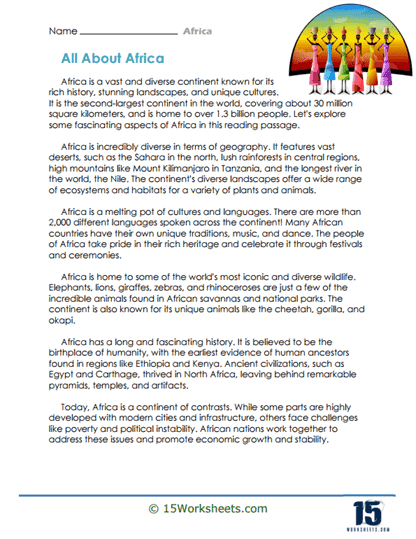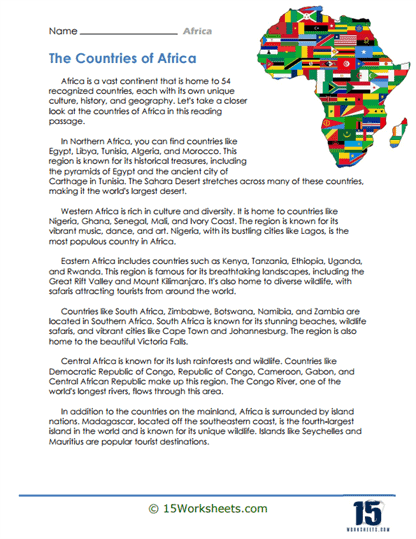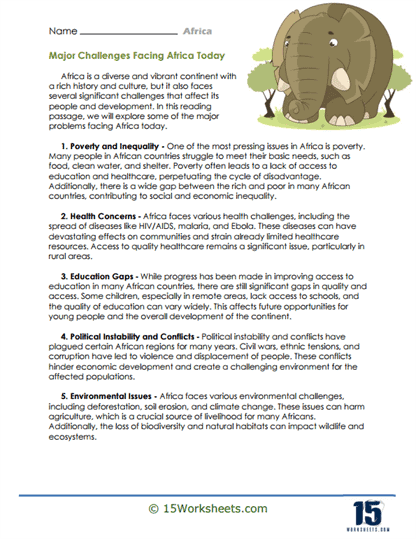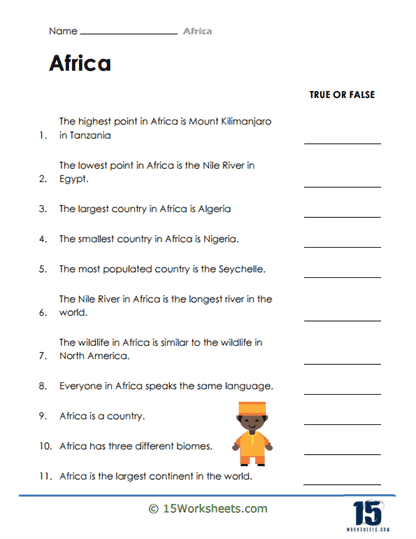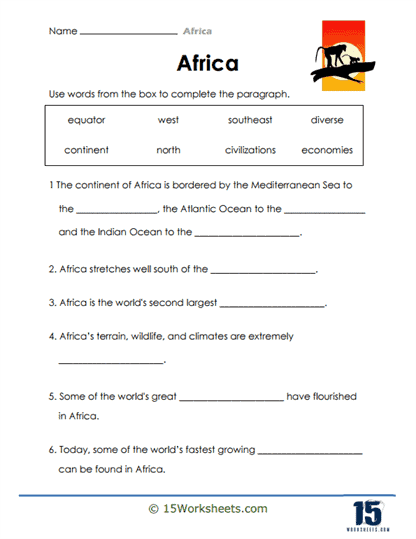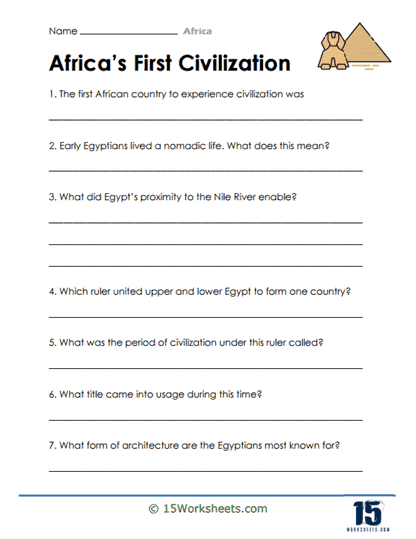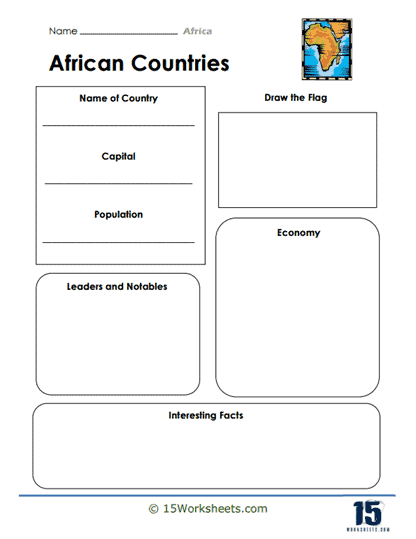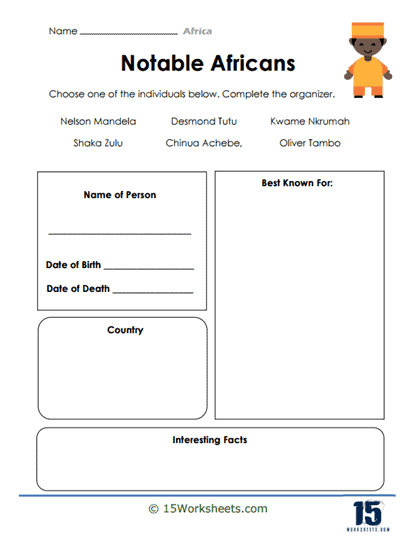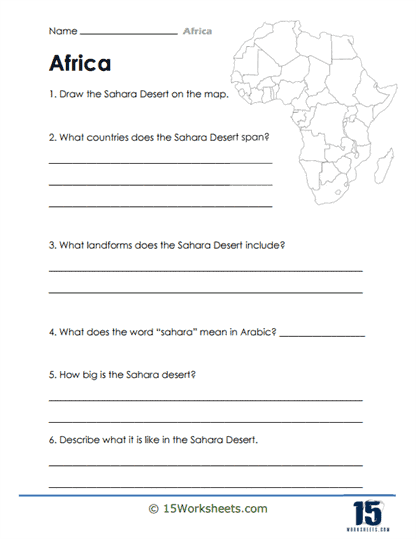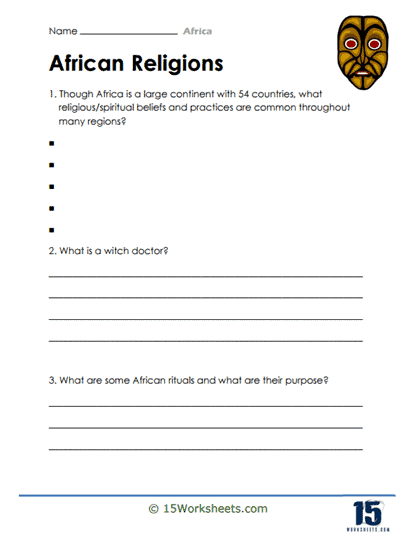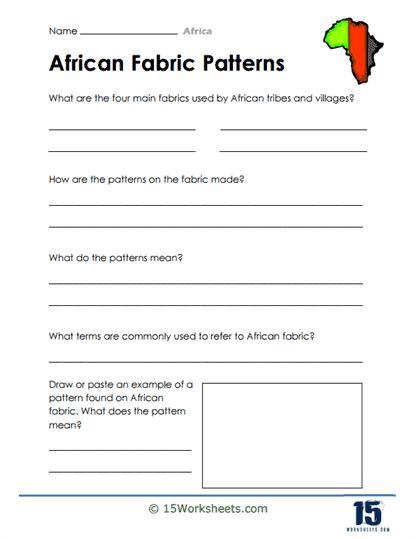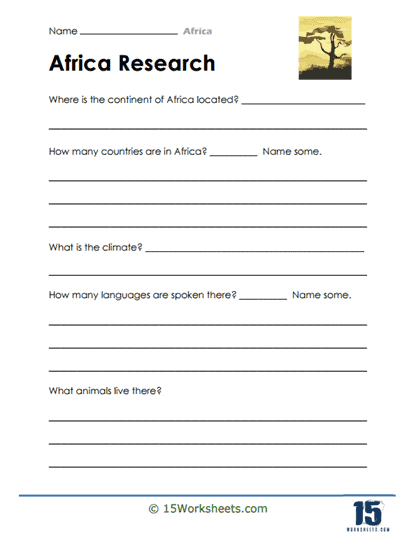Africa Worksheets
About These 15 Worksheets
These Africa worksheets were created to teach students about the African continent. These worksheets cover a range of topics including geography, history, culture, economy, and current affairs. They are used in educational settings to enhance students’ understanding of Africa, its diversity, and its role in the global context.
These exercises are crucial in developing students’ knowledge, critical thinking, and global awareness. They enable students to appreciate the diversity and significance of Africa, both historically and in the contemporary world, which is vital for their development as informed global citizens.
Types of Exercises
Map Labeling and Geography Quizzes – These exercises help students identify African countries, capitals, major cities, rivers, mountains, and other geographical features. They may also include climate zones and natural resources.
History Timelines and Events – Worksheets often include timelines of significant historical events, such as ancient civilizations (like Egypt and Nubia), colonialism, the slave trade, independence movements, and post-colonial developments.
Cultural Studies – Activities that focus on various African cultures, languages, festivals, traditional clothing, music, and art. This may include comparing and contrasting different cultural practices across the continent. These exercises might involve reading and discussing current news articles about Africa, covering topics like politics, economy, health issues, and environmental challenges. Worksheets that delve into Africa’s economy, including agriculture, industry, trade, and challenges like poverty and development. Focus on important personalities in African history and contemporary times, such as Nelson Mandela, Kofi Annan, Wangari Maathai, and others.
Environmental Studies – Covering Africa’s diverse ecosystems, endangered species, conservation efforts, and environmental challenges like climate change and deforestation. Reading and analyzing African literature, folktales, and proverbs, which provide insights into the continent’s rich oral and written traditions. Worksheets that encourage students to compare African countries or compare Africa with other continents in various aspects.
Why Is Learning About Africa Important?
Understanding and learning about Africa is critically important for students across the globe, not just for academic enrichment but also for fostering a deeper global awareness and appreciation of diversity. This continent, with its rich history, diverse cultures, and complex socio-economic dynamics, plays a vital role in shaping global perspectives. A comprehensive education about Africa serves multiple purposes, from challenging stereotypes and misconceptions to providing essential historical context, thereby enriching students’ knowledge and worldview.
Learning about Africa helps in challenging the prevalent stereotypes and misconceptions. Often, the portrayal of Africa in media and popular discourse is oversimplified or skewed, focusing predominantly on negative aspects like poverty, conflict, or disease. An in-depth study of Africa, its history, its people, and its vast cultural diversity helps to dispel these stereotypes, presenting a more nuanced and balanced view of the continent. Students learn to appreciate the rich tapestry of African cultures, languages, and histories, fostering a greater understanding and respect for diversity.
The historical context of Africa is crucial for a comprehensive understanding of contemporary global issues. The continent’s history, marked by ancient civilizations, colonialism, the transatlantic slave trade, and struggles for independence, has profoundly impacted the global socio-political landscape. By studying these aspects, students gain insight into the historical forces that have shaped not only Africa but also the world. This understanding is essential for comprehending current international relations, economic policies, and social dynamics.
Africa’s economic significance cannot be overstated. With its emerging markets, vast natural resources, and burgeoning population, the continent is increasingly influential in the global economy. An understanding of Africa’s economic landscape, including its challenges and opportunities, is important for students who will be tomorrow’s professionals, entrepreneurs, and policy-makers. This knowledge equips them to engage more effectively and responsibly in a globalized economy where Africa plays an integral role.
Environmental education is another critical aspect of learning about Africa. The continent is home to some of the most diverse ecosystems and species on the planet, many of which are under threat due to climate change, deforestation, and other environmental challenges. By studying these issues, students develop an awareness of global environmental concerns and the importance of conservation efforts. This knowledge is essential in cultivating responsible attitudes towards environmental stewardship and sustainable development.
Exposure to Africa’s cultural heritage, including its art, literature, and historical narratives, serves as a source of inspiration and creativity. African art and literature are rich and varied, offering students new perspectives and ways of seeing the world. This exposure broadens their artistic and literary horizons, fostering creativity and a deeper appreciation for global cultural expressions.
Critical thinking and problem-solving skills are also honed through the study of Africa. The continent’s complex issues, such as development challenges, political instability, and social inequalities, require nuanced understanding and thoughtful analysis. Engaging with these topics encourages students to develop critical thinking skills, enhancing their ability to analyze, interpret, and propose solutions to complex problems.
Learning about Africa fosters empathy and a sense of social responsibility. Understanding the diverse life experiences and challenges faced by people in different parts of Africa cultivates empathy in students. This empathy extends beyond academic knowledge, instilling a sense of social responsibility and a desire to contribute positively to the world.

